Suddenness in the tactics of Suvorov
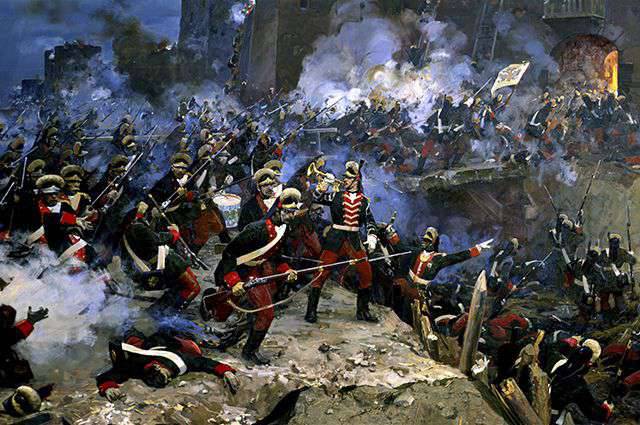
Suddenness as a means of achieving the fastest and most complete success in battle and operations sought to use all the outstanding commanders and military leaders. In different periods of the development of military art, the forms, methods and techniques for achieving surprise were different. Particularly high skill in their application made A.V. Suvorov. Among the great commanders of the military story it's hard to find the second such creator of victories. All his military enterprises, both tactical and strategic, are permeated with the idea of surprise; all his military teachings left to contemporaries and descendants are saturated.
In varying degrees, the surprise factor is present in all the battles, battles and military campaigns conducted by Suvorov. The essence of surprise lies primarily in innovation, in the unexpected use of new tactical means of combat or unusual methods and techniques of warfare for the enemy, the absence of a pattern in them. A.V. Suvorov entered military history precisely as an innovative commander, a carrier of advanced Russian military thought, many of whose principles of military art were ahead of their time and were incomprehensible to his opponents. To beat the opponent with what he doesn’t have, “surprise-win” is one of Suvorov’s mottos.
New original methods and techniques for conducting military operations commander sharply differed from the adopted tactical and strategic systems of the time, used by almost all other armies. He denied the foundations of the generally accepted modern military theory and "overthrew the theory of his century" practice. The principle of surprise organically flowed and was inextricably linked with the main principles of warfare, set out by Suvorov in the Science of Victory: an eye, speed and onslaught. The particular merit of these three principles, the Russian commander saw precisely in that they ensured the attainment of surprise and the effective use of the advantages obtained as a result of its advantages over the enemy. "... Complete surprise," wrote Suvorov, "which we use everywhere, will consist in the speed of assessments of the value of time, the onslaught." And further: “... in military actions one should quickly figure out - and immediately execute, in order for the enemy not to give time to come to his senses”.
The great commander was well aware that the factor of surprise is a temporary factor. Its action lasts until such time as the enemy is stunned by a sudden attack or by unexpected methods and methods of armed struggle that are unusual for him. But as soon as he overcomes confusion, he can eliminate the inequality caused by them in the context of the struggle, the suddenness factor will exhaust itself. Therefore, Suvorov demanded the immediate realization of the advantages achieved by surprise. “Time is the most precious,” he said.
To overwhelm the enemy with swiftness and surprise is the credo of Suvorov's commanding art. "One minute decides the outcome of the battle, one hour - the success of the campaign ..." This rule was strictly followed by the commander in all wars and battles. With sudden actions, he always seized the initiative and did not release it until the end of the battle, and in order to prolong the effect of the surprise factor, he sought, after one surprise, to use another. The arsenal of his receptions was inexhaustible. It is hardly possible to find two battles conducted by him, which would repeat one another.
Suvorov had to lead the fighting in a variety of conditions. And he always knew how to benefit from their features. His decisions were often the most unexpected, always daring, based on the principle that what the enemy considers impossible to do in war. The speed and decisiveness of action, combined with surprise, filled Suvorov with a shortage of troops and allowed him in almost all battles to achieve victory over the superior forces of the enemy. "Speed and suddenness replace the number." Suvorov gave amazing and unique examples confirming this thesis. From the 63 battles and battles he conducted, in 60, he defeated an enemy that was superior to his forces sometimes by 3-4 times or more. Moreover, Suvorov won the most brilliant victories over one of the strongest Turkish armies and the best French armies in Europe.
Even more surprising was that their victories were achieved with little blood, with significant losses to the enemy. So, in the battle of Rymnik in 1789, he defeated the 100000 of the Turkish army, which was four times more numerous than Russian troops. Even more surprising is the victory at Ishmael. One of the strongest fortresses of that time, which had a 35-thousandth garrison and was considered impregnable, Suvorov took by storm with the 31-thousandth army, destroying 26 thousand in battle and capturing 9 thousand enemy soldiers and officers. Suvorov’s army lost 4 thousand people killed and 6 thousand wounded.
Detractors and enviers, who did not understand the uncommonness of Suvorov’s fighting techniques, who were unable to appreciate the role in them of speed and surprise, considered his victories over the Turkish army just luck, and when the Russian commander in 1799 took the lead of the Allied forces in Italy, they did not believe that he to get the upper hand and win equally brilliant victories over the French, with triumph past in many European countries. However, they could not counter anything with Suvorov tactics. Thus, in the battle at Trebbia, he defeated MacDonald’s 33-thousand army, having 22 thousand; lost 6 thousand, the French - 18 thousand soldiers. In the battle of Novi, his army, storming the fortified positions of the enemy, lost 8 thousand, and the French lost 13 thousand.
These are the results and the price of Suvorov victories. They certainly consisted of many factors, but suddenness played a pivotal role in them. It was not the result of an instantaneous improvisation of the commander, but consciously prepared in advance based on the prediction of the upcoming battle. Only knowledge of the situation, military art and the psychology of the enemy, its weaknesses, the continuity of intelligence, as well as well-trained, well-trained, high-morale, highly combat-ready troops, can achieve the effect of surprise.
All this perfectly understood Suvorov, and above all, with his system of training and educating the troops, he was preparing the Russian “miracle heroes” who were able to quickly accomplish any of his plans, any maneuvers, and go for any feat. Fostering courage and courage, self-confidence in his soldiers, Suvorov was guided by the principle that “nature rarely gives birth to brave men, they are created in a multitude by work and education”. The army, prepared by Suvorov, was a reliable guarantor of the successful implementation of the brilliant ideas of the commander. Suvorov was also an innovator in management. To skillfully use the situation and stun the enemy with surprise, he not only gave his subordinates the right to broad initiative, but demanded it. However, this right of “private initiative” was still strictly stipulated in 1770 year by the requirement: to use it “with reason, art, and under the answer”. The ability of the initiative to be used by private commanders — the innovator commander — ensured that he abandoned the principles of linear tactics — to keep the ulnar relationship between individual units of the army in combat.
The basis of Suvorov’s sudden actions was a quick and correct assessment of the situation and the boldness of the decisions made (such as attacking superior forces of the enemy with small forces); swift and secretive march to the battlefield; the use of new, unexpected for the enemy battle formations; unusual use of types of troops; the direction of attacks, unexpected for the enemy, including from the rear, the overwhelming rapidity of attack and attack, the use of a bayonet strike, unusual and inaccessible to other armies; a bold and unexpected maneuver on the battlefield; surprise counterattacks; the use of night attacks; skillful use of the terrain, weather, psychology and mistakes of the enemy.
In each battle, Suvorov sought to use almost a whole range of techniques to achieve surprise, skillfully combining them depending on the current situation and instantly reacting to any changes, any adversity of the enemy, did not miss a single incident that allowed him to snatch victory. Suvorov’s ability to instantly grasp all the subtleties of the situation, foresee the intentions and possible actions of the enemy, notice his weaknesses and failures, capture his psychology amazed contemporaries and instilled confidence in the correctness of his decisions to the troops, no matter how risky they seemed. This opened up ample opportunities for Suvorov to act suddenly.
Take at least his decision to assault Ishmael. During the year, the Russian army unsuccessfully besieged this fortress and twice retreated from its walls. The military council that met shortly before Suvorov’s arrival acknowledged the impossibility of active actions against Ishmael. A completely different decision was made by Suvorov, joining the command of the army. It was so unusual and unexpected that the commander himself admitted: this can only be decided once in a lifetime. Suvorov chose the assault. This was contrary to the rules of the "classical" art of the serf war of that time, which were reduced to a methodical engineering attack of the fortress. Even more unexpected was the decision of Suvorov for the enemy, who was already convinced of the inaccessibility of the Izmail walls by experience.
Huge importance in achieving surprise gave Suvorov speed and secrecy of the march to the battlefield. In order to secure the possibility of “falling on” the enemy “like snow on his head”, Suvorov developed and set forth his own march rules in “Science to win”, and by persistent training of the troops he achieved amazing results. The normal transfer of troops under the command of Suvorov was from 28 to 35 versts per day, that is, it was 3-4 times more common than the norm of such transfers in the West at that time, and even the Friedrichs' standard was 2 times. But this was not the limit. With a forced march, Suvorov troops marched up to 50 versts. In anticipation of the enemy, Suvorov built the marching order closer to the battle order, so as not to waste time on rebuilding, to ensure the surprise of the attack and to seize the initiative in battle. Usually they were platoon columns or quads (Suvorov’s battle formations were used depending on the nature of the enemy). Most of the marches were held secretly, at night, regardless of any weather.
Especially characterized by the sudden actions achieved as a result of the rapid marches, the 1789 campaign of the year. The appearance of the Russians on the battlefield during the battles of Focsani and Rymnik was completely unexpected for the Turks. In the first battle, the 5-thousandth Suvorov detachment, which left 17 in July from Barlad to assist the allies - the Austrians, overcame on very bad roads with a crossing over the r. Gray for 28 hours 50 km. Having quickly dealt with the situation, the next day Suvorov proposed a bold plan of attack. In order to hide from the Turks until the decisive moment the appearance of Russian troops on the battlefield, the Austrians were put in the vanguard of the column. In September of the same year, again responding to the Austrians' request for help, the 7-thousandth division of Suvorov made, under even more difficult conditions, an 100-kilometer march from Barlad to Ramnic for more than two days. Even the commander-in-chief of the Russian army, Potemkin, did not believe in the possibility that Suvorov would be able to arrive in time to help the Austrians, as he wrote to Catherine II on September 10. Meanwhile, Suvorov was already in the camp of the Austrians this morning.
The speed of the marches was of paramount importance in other military campaigns. In the Italian campaign 1799, the 80-kilometer transition to the scorching heat of the 22-thousandth Russian army from Alexandria to r. Trebbia, done in 36 an hour, allowed Suvorov to preempt the unification of two French armies and defeat them one by one.
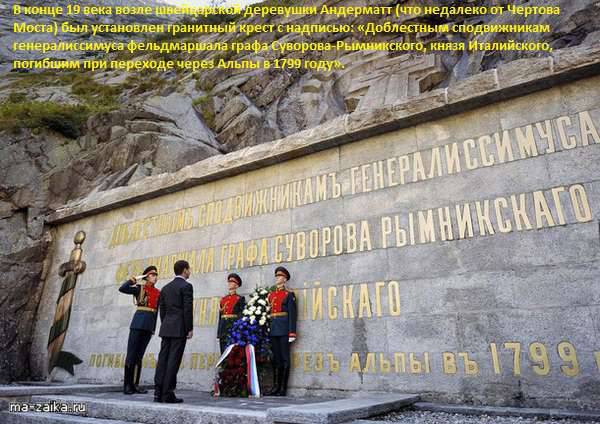
In each battle, Suvorov stunned the enemy with unusual and new tactics. Even on the experience of the Seven Years' War of 1756-1763, recognizing the unsuitability of linear tactics for decisive and sudden actions, he later boldly rejected her templates, primarily outdated forms of battle formations that limited the maneuver of troops on the battlefield.
In May, 1773, in the battles for Turtukai, when the Turks during the night raid discovered a Suvorov detachment, secretly preparing to cross the Danube, he decided not to lose the surprise factor, to attack the enemy that night. His calculation, based on the fact that the Turks do not expect such a quick Russian attack, was fully justified. In the battle under Turtukai, he first attacked the platoon columns that acted together with the rangers of the rangers, and contrary to the general rule, he categorically forbade stopping before throwing an attack to wait for the lagging behind.
No less successfully, Suvorov used night attacks in other battles and battles. Contrary to the opinion of the Western European authorities, the Russian commander believed that night battles and marches with their skilful organization were the best way to achieve surprise and quick success. The night battles available to Suvorov with his “wonder-knights” turned out to be beyond the power of most other commanders of the time, and therefore were an unusual phenomenon and had a stunning effect on the enemy. They were especially unacceptable for mercenary armies.
Full of tactical surprises were the battles of Focsani and Rymnik. Alexander Vasilievich used here new battle formations. In conditions of severely rugged terrain and in the presence of numerous cavalry among the Turks, Russian troops advanced with two lines of infantry squares, behind which cavalry lined up in one or two lines, ready for sudden attacks. Suvorov also retreated from the fundamental positions of linear tactics - a close elbow connection between separate parts of the army. Having smashed the Turkish troops in the field, he immediately attacked their fortified camps. In the Battle of Rymnik, the main fortified positions — trenches reinforced with chasers, were also attacked by cavalry, contrary to the rules, which led the enemy, who had not yet managed to gain a foothold, into complete confusion.
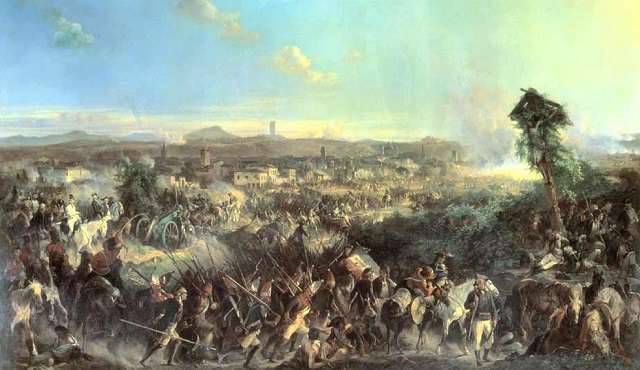
With the defense of Girsovo in 1773 and Kinburn in 1787, Suvorov used pre-prepared counterattacks to defeat superior enemy forces. In Girisovo, with the help of deliberately retreating Cossacks, he lured the advancing Turkish troops under fire, who had been silent before, with serf batteries, and at the time of the Turks' confusion, suddenly attacked the enemy. At Kinburn he did not hinder the landing of the Turkish troops from the sea. When the Turks approached the walls of the fortress, the Russian troops secretly concentrated to counterattack unexpectedly fell on them.
The Italian and Swiss campaigns were the crown of A.V. Suvorov. In them, he proved himself to be not only an unsurpassed tactician, but also an outstanding strategist, a great and inexhaustible master of innovation in the use of not only tactical, but also strategic surprise.
Already the general plan and the principles of warfare set forth in Suvorov in Northern Italy turned out to be unexpected for the French. Instead of passive, sluggish, methodical actions that boiled down mainly to fighting for individual fortresses (their siege) and leading to dispersal of forces, Suvorov immediately demanded an offensive in order to attack the enemy and “beat everywhere”, not to waste time on sieges and not divide forces. At the same time, he recalled his main rule, which provides for suddenness: "Speed in hikes, swiftness."
The very beginning of active offensive actions in the spring thaw, during the flood of the rivers, was unusual for the French in its uniqueness. Retreating from the generally accepted rule - waiting for good weather, Suvorov demanded from his subordinates not to be afraid that the infantry would wet their feet. Nor was he embarrassed by the need to force several rivers on the way to the offensive. In his opinion, not only the rivers Adda and Po, but all the other rivers in the world are passable.
Starting the Italian campaign, Suvorov was not slow to take advantage of the enemy’s miscalculation - the dispersion of his forces; moreover, he took into account some of the individual characteristics of the French army commander, General Scherer - his pedantry and slowness. The character of the offensive launched by Suvorov 8 on April 1799 of the year p. Adda He abandoned the normally accepted collection of all forces of the army for an offensive in one point (the original area) and was the first to use the concentration of offensive forces during the operation. Having thus won the time, he deprived the enemy of the possibility of taking countermeasures and was able to reach the intended section of the forcing of the r. Adda focus 55-60%, the composition of the advancing troops. In the battle on Adda 15-17 on April, where the enemy tried to stop the rapid advance of the Suvorov troops, the French lost 3 thousand people killed and 2 thousand prisoners with a total loss of allies, slightly exceeding a thousand people. The speed of action, multiplied by surprise, ensured success. Having accomplished the 36 march in 24 hours, and having misled the enemy with his skillful maneuver, Suvorov brilliantly realized the victory on Adda and on April 18 joined the troops in Milan.
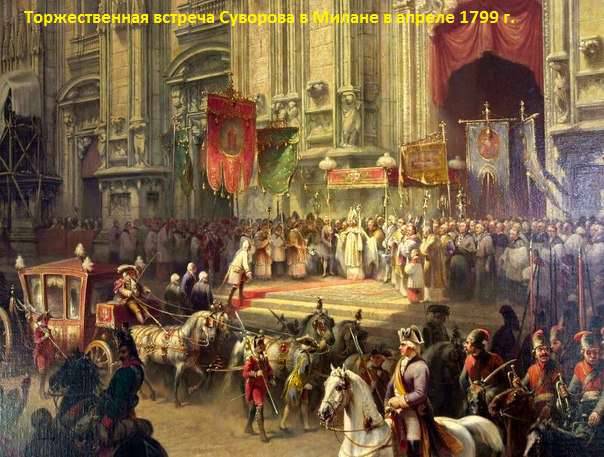
Worried about defeat, Paris replaced Scherer with a talented General Moreau and sent the second French army, led by MacDonald, against Suvorov from Naples. But even in a changed, more complex situation, when Suvorov’s troops found themselves between two enemy armies operating along external operational lines, the great commander used speed and surprise, found new tactical solutions that were unexpected to his opponents and defeated both their armies in turn.
In a battle on the rivers Tidone and Trebbii, he attacked the enemy, making a counter march, and immediately seized the initiative. Such an option Suvorov foresaw and pre-allocated a strong vanguard (Ott's division), was with him and personally led the ensuing battle. The oncoming battle brilliantly carried out by Suvorov was a new phenomenon at that time and, as we know, was not repeated by any of his contemporaries, including Napoleon.
The character of the offensive of the main forces of the Russian-Austrian forces also turned out to be just as unusual for the French - in three columns (divisions) without an ulnar link, each of which was indicated by an independent direction and tasked to the depth of 20 km. Thus, Suvorov raised the art of maneuvering troops on the battlefield to a height unattainable for that time. He managed to focus on the 3-kilometer stretch against the enemy’s open left flank, where the main attack was delivered, 24 thousand people, leaving the rest of the 6-kilometer front no more than 6 thousand. Such a decisive concentration of forces was just as unusual as other tactical decisions commander. Quite differently, and again unexpectedly for the enemy, Suvorov acted against the second French army. When, filled with fresh forces and reorganized by the new commander Joubert, in July 1799, she began to move four columns across the mountains from the region of Genoa, the Russian commander could break one of her columns, which reached open terrain. However, Suvorov did not do this so that the French would not withdraw to Genoa by the rest of the forces and thus retain their fighting capacity. On the contrary, he ordered his avant-garde to retreat, luring the enemy from the mountains. This created a more favorable position for the Russian army for the defeat of all Joubert's forces at once. When Joubert understood Suvorov’s maneuver and went on the defensive of Novi, the Russian-Austrian troops, preventing him from gaining a foothold in advantageous fortified positions, launched an offensive and on August 4 defeated the French army. By the time of the battle, Suvorov had managed against 35 thousand French troops to concentrate 50 thousand people. Demonstrating the intention to deliver the main blow to the left flank of the French and forcing them to transfer the main forces, including the reserve, the Russian commander directed the main forces against the right flank of the enemy at the height of the battle, putting him again in surprise. Unusual for that time, the deep structure of the troops (up to 10 km) allowed Suvorov to increase the force of the strike, and at the crucial moment to engage almost all the troops at once. The battle of Novi entered the history as a brilliant example of misleading the enemy with a skillful maneuver and skillful use of the element of surprise.
The basis of the entire Swiss campaign A.V. Suvorov 1799 of the year was a requirement: "Fast, not weakened and non-stop striking the enemy blow by blow, confusing him ...". Suvorov sought to stun the enemy with an unexpected appearance in Switzerland, thanks to the rapid march through the Alps in autumn. However, the forced 5-day delay in Tavern, due to the betrayal of the Austrian command, prevented him from reaching full surprise. Yet brilliantly using tactical surprise, skillfully combining frontal attacks with detours along the mountain tracks of the flanks and unexpected strikes from the rear for the French, the Russian army defeated the enemy troops standing on its way in the Alps, thereby refuting the views on the limited actions on high mountain theaters of war.
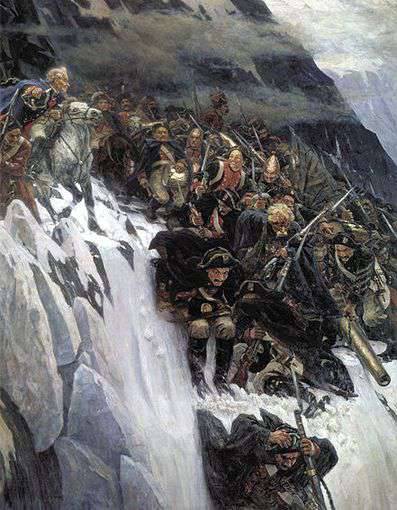
Until the end of his days, Suvorov remained faithful to the principles of warfare, among which surprise was so important. For all the years of his leadership activity, the most diverse highly experienced opponents in none of the battles have managed to solve his “surprises” and “inadversions” in time and oppose them in order to avoid defeat. Better than others, Napoleon Bonaparte, who was already renowned at that time, noticed the secret of Suvorov’s successive victories. He saw him in the unusual and unexpected Suvorov actions, in his distinctive martial art. With caution and interest following the unchanged successes of the great Russian commander, Napoleon, in his Directorate of the Directorate, indicated that no one could stop Suvorov on the path of victories until they understood and comprehend his special art of war, and would not oppose his own rules to the Russian commander. Napoleon himself, took over part of the tactics from Suvorov, and above all his speed and surprise in the attacks.
More than two centuries separates us from the military events associated with the general activity of Suvorov. However, the experience of the brilliant Russian commander, who is our national pride, like many of his thoughts about the role of surprise and how to achieve it in combat, has not lost its meaning until today. During the Great Patriotic War, the Order of Suvorov was established by decree of the Presidium of the Supreme Soviet of the USSR as the embodiment of supreme military valor and glory. They were awarded commanders for outstanding successes in command and control, excellent organization of military operations and the determination and perseverance shown in their conduct. During the war years, the Order of Suvorov was awarded 7111 people, 1528 parts and connections.
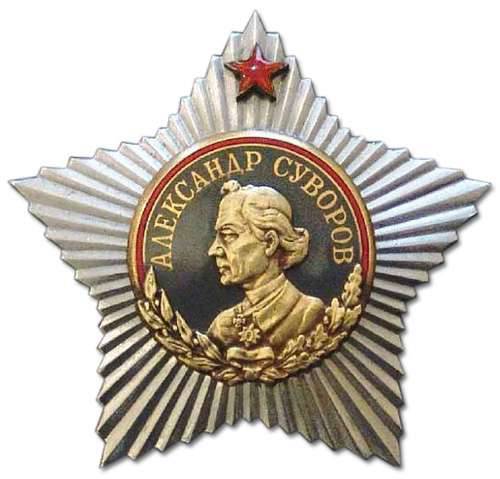
Sources:
Rakhmatullin M. Generalissimus A.V. Suvorov. His art to win // History of the USSR. 1980. No.5. C.64-90.
Lobov V. Military trick. M .: Moscow Military Historical Society; Logos, 2001. C. 58-70.
Ivanov V. Suddenness in military art // Military-Historical Journal. 1979. No.6. C. 86-91.
Semenov K. 100 of the great commanders of Russia // M .: Veche, 2014. C. 171-179.
Mikhailov O. Suvorov. ZHZL. M .: Young Guard, 1973. C. 214-219.
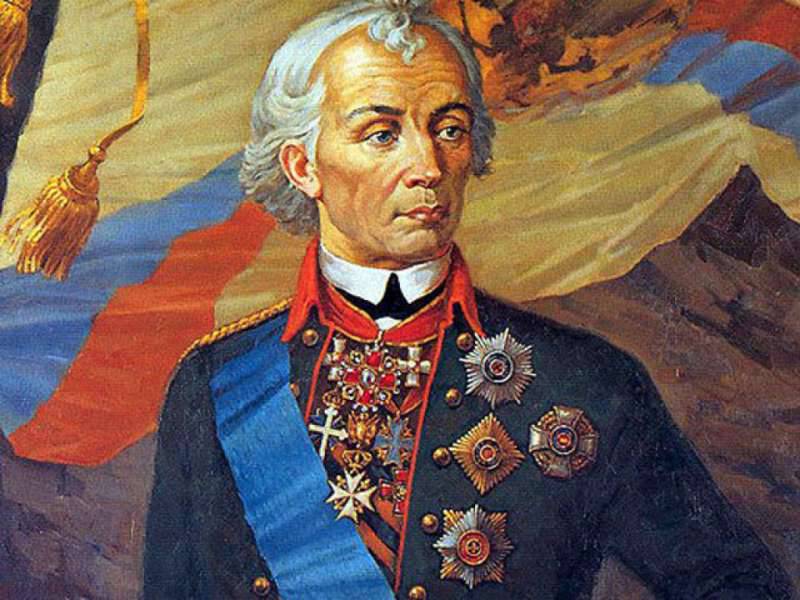
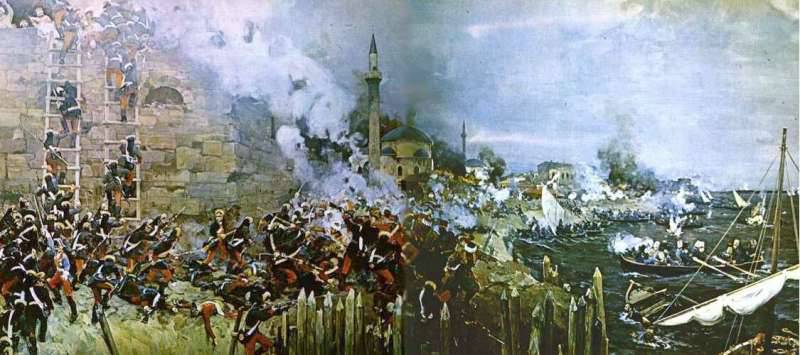
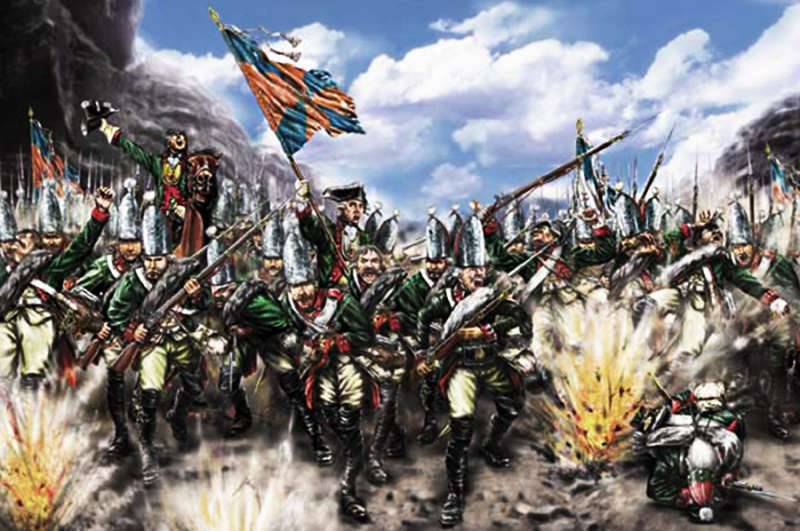
Information